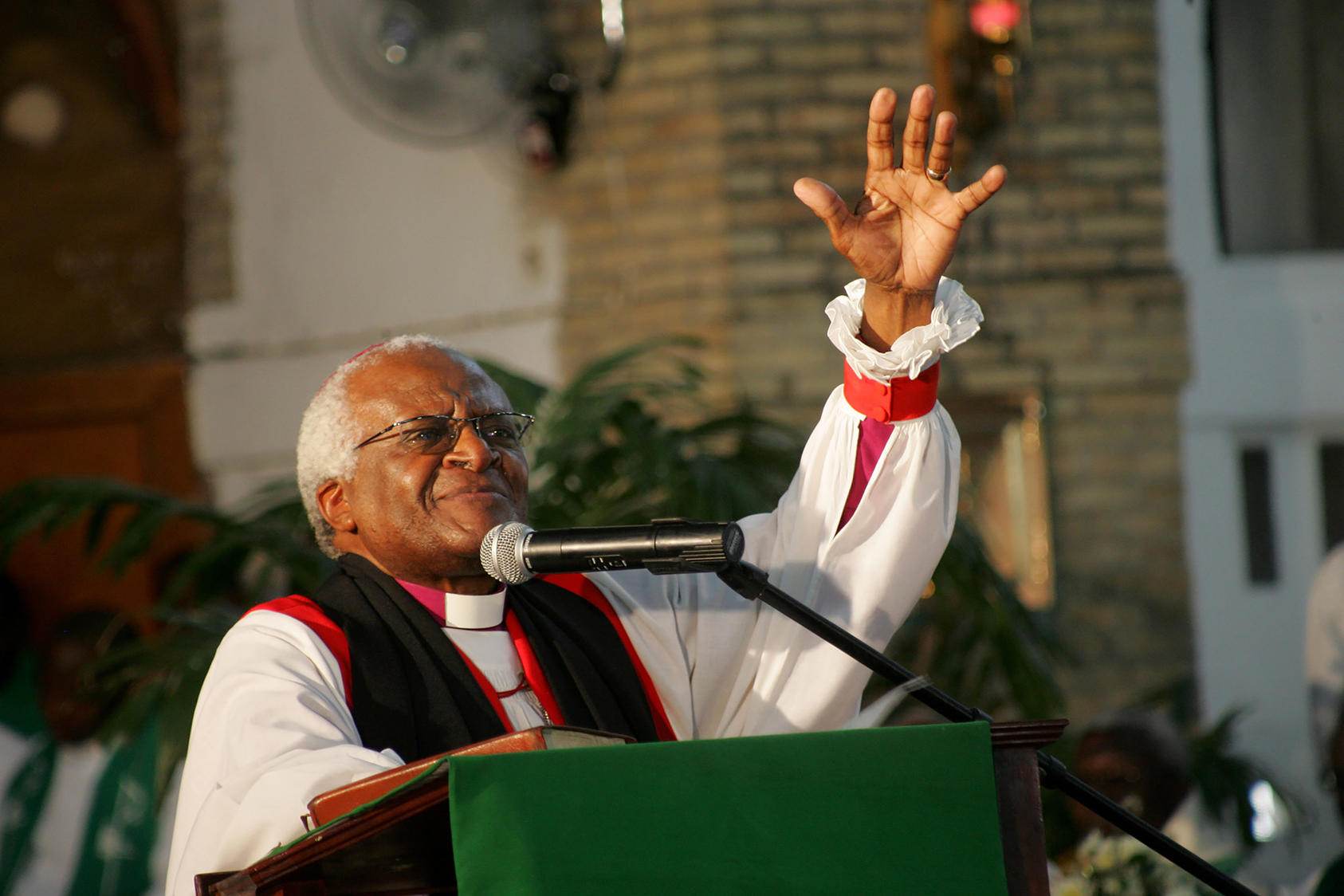On December 26, the world lost a “moral compass,” Archbishop Desmond Tutu of South Africa, aged 90. Grounded in his Christian faith, his legacy as a peacebuilder through his anti-Apartheid activism and promotion of peace and justice is unparalleled. Tutu’s great influence on the field of peacebuilding, and his mark on peace and reconciliation efforts have rippled worldwide. Here are four attributes that Archbishop Tutu exemplified as a religious peacebuilder, radically inspiring people across the globe to fight injustice and advocate for peace.

1. Leadership with Honesty and Integrity
Tutu is an exemplar of faith-based peacebuilding. Inspired by Christian moral teaching, he used his platform as a religious leader to fight for social justice by advocating for reconciliation and forgiveness. As South African president Cyril Ramaphosa reflected, Tutu was “a leader of principle and pragmatism who gave meaning to the biblical insight that faith without works is dead.”
As chairman of South Africa’s Truth and Reconciliation Commission in the 1990s, Tutu sought to apply the principle of restorative justice, in contrast to “retributive justice” that he believed would not achieve lasting peace in a post-Apartheid South Africa. His credibility as a religious leader and public moral figure was critical to the Commission’s efforts.
Archbishop Tutu also led the effort to ordain women in leadership in South Africa’s Anglican church, promoting gender inclusive leadership. His leadership on gender inclusion did not stop with the church. He called for including religious women in dialogues and the anti-Apartheid movement and was an adamant supporter of LGBTQ+ rights.
2. Local, National and International Advocacy
Tutu used his platform to advocate against injustice beyond South Africa’s borders, calling out human rights violations and actively advocating for rights for all — and nonviolent means by which to achieve them. “When there is injustice, invariably peace becomes a casualty,” he said at his 1984 Nobel Peace Prize acceptance speech. In a 2004 op-ed, he said, “For our nation to heal and become a more humane place, we had to embrace our enemies as well as our friends. The same is true the world over. True enduring peace — between countries, within a country, within a community, within a family — requires real reconciliation between former enemies and even between loved ones who have struggled with one another.”
He mobilized religious leaders and institutions and influenced world leaders to pressure the Apartheid government to abolish racist policies and practices. He continued to be a moral authority within South Africa as Nelson Mandela’s African National Congress assumed power, informing leadership while unabashedly calling out missteps and continuing to serve as a religious leader engaging with the community.
3. De-escalation and Healing
As a staunch advocate of nonviolence, Tutu courageously and notoriously stepped in, using his authority as a religious leader to prevent violent situations from escalating, including atrocities carried out in the name of Apartheid. Yet he went beyond a surface-level reduction of tension and violence to proactively realize that deeper grievances needed to be addressed in order for a divided nation to heal. As Archbishop of Canterbury Justin Welby wrote in a recent tribute, “[Tutu’s] vision and bravery were allied with a canny political sense and wisdom, enabling him to be a healer and an apostle of peace while so many still saw wounds and war.”
His principles of forgiveness provide models for peace processes and reconciliation across contexts. He was a vocal supporter of the peace processes in Northern Ireland and Israel and the Palestinian Territories, for example, and raised awareness of other global injustices — from the persecution of Rohingya to advocating for LGBTQ+ rights.
4. Bridge-building
A Christian leader of the Anglican tradition, Tutu was a friend to many within and outside of his own denomination. Most famous, perhaps, is his friendship with His Holiness the Dalai Lama, with whom he would share a stage — and laughs — and together promote human rights and justice. At home in Cape Town, he was also known to convene interfaith services — with Muslims, Jews and members of other Christian denominations — encouraging cohesion among people of all faiths. He started a popular peace lecture series in 1985 featuring religious leaders speaking about peace from their religious traditions including Maulana Farid Esack, Rabbi Julia Neuberger, Sewmugal Satgar, South African Hindu Maha Subha, and Ela Gandhi, the granddaughter of Mahatma Gandhi.
His legacy inspires the work of peacebuilders everywhere, including at USIP, and in the work that we do to support the courageous efforts of religious actors to prevent and resolve violent conflict with inclusion and gender sensitivity. As Tutu wrote, “[C]onfession, forgiveness, and reconciliation in the lives of nations are not just airy-fairy religious and spiritual things, nebulous and unrealistic. They are the stuff of practical politics.”
Desmond Tutu was a spiritual and moral giant, bravely stepping forward to create a lasting pathway for peace. He sought reconciliation when others wanted retribution. He sought healing when others wanted revenge. The world is a better place because of his leadership and example.
His call for all to engage in the practice of peace is one that continues to inspire.
“Let us work to be peacemakers, those given a wonderful share in Our Lord’s ministry of reconciliation,” he said during his Nobel prize acceptance speech. “If we want peace, so we have been told, let us work for justice. Let us beat our swords into ploughshares.”



